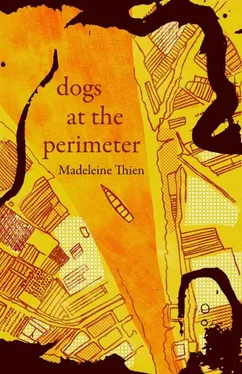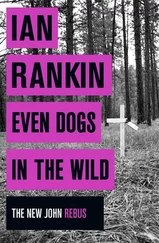“The bombs are coming,” I tell him. “They are coming, they are coming.”
I feel my legs floating, as if I am flying through the streets.
I’m standing at the intersection of Côte-des-Neiges and Queen Mary, snow settling on us, and a woman tells her child, We are safe as houses . The saying falls straight through me. The light turns green, nothing approaches, I begin to walk, and the low buildings seem to bend over me. I see my father in the shape of another person, walking up ahead. I see the suit of clothes he used to wear, the haircut he had, his briefcase and his scuffed, worn-down shoes. I run up to the man who is not my father, grab his elbow, and spin him around to face me. A stranger swears and flings me away.
I am home again, inside the safety of our apartment, my father is standing behind me, dictating the words I have to transcribe. When I type, I feel the machine as an extension of my hands, my father’s voice is rainfall, and I am a weed lifting up too fast, gangly and hungry and gaping in every direction. That typewriter, that gift, is my first real possession. Sometimes when I type, I pay attention to the words themselves, what they say and mean, but other times they are only strings of letters, arranged like beads, joined together by the metronome of the Olivetti. The words materializing on the page, this alphabet so different from the shivering, dancing Khmer script, seemed to me like crevices I could peer through, portholes into lives different, more gracious, than my own.
Someone says my Canadian name. Janie . Another woman turns and waves. I am standing in Montreal, on a white winter day, beneath unfamiliar buildings. I look everywhere for Janie. There are no trees, no forest anywhere, nothing to keep the light from falling through.
My father is a storyteller. He smiles and whispers at us to follow him, behind the curtain, into this starlit box. Hanuman, my favourite hero, wraps his giant hands around my little fingers. Tonight, he says, we will travel the world with Jambavan, the king of bears. My father can recite all the shiny strands of the Ramayana, he cajoles my brother and I with brave musketeers, with Tum and Teav and Molière. He gives us any story we ask for, especially tonight, because on this night, he says, the war is ending. Rocket fire burns the skies but tomorrow everything will change. Even as the shells fall down, our neighbours are dancing and welcoming the Khmer new year.
On the balcony, I sat down, leaning against my father’s body. I was afraid and I didn’t want to be apart from him. Fighting chipped away at the edges of the city, and Sopham pointed out the smoke advancing from the north, south, and west, like a necklace tightening. Tracer fire threw long lines into the darkness.
My father cradled his whiskey and called for the Communists to hurry up, to end the war once and for all. “Once the guns go quiet,” my father said, “the Khmer Rouge will put everything right. Then you, my dancing, kralan -eating children, will go back to school. No more running wild. No more fighting in the streets.” Our prime minister, otherwise known to us as Magic Sands, had fled the country. Monsieur le sableur des feés , our father called him, who defended our city with holy grains, who armed our soldiers with Buddhist scarves. Magic Sands had already been evacuated.
“Remember this night,” he said. “Mark it in your memories because tomorrow everything changes.” He smiled and shook his head and swirled the liquid in his glass. “Tomorrow, when your mother puts on her New Year’s finery, she’ll be the most beautiful woman in the city. The war is finished, little ones. We’ll gather all the sadness into a pot, pour it down the drains, and hear it rush into the sea. The king will wake up in the Royal Palace, and everything will be just as it was. As wonderful and as corrupt as it ever was.” He lay down, staring up at the sky. Beads of sweat trickled down his face, into his hair.
“I should have gone to France,” my father told us. “I should have carried your mother to Paris and we would have been poor together. You two, you and Sopham, you would have been born in the West, like champions!”
“Champions of what?” I asked.
“Champions of champions,” my brother said.
“We would have flown Air France,” my father said. “Just like that, on top of the world, sipping champagne. We would have set Europe on fire: your mother and your father, the beauty and the poet.”
“And me, Pak?”
“You, Sopham? The singer, of course.” My brother, frowning, did the twist for us.
“And me?”
What did he say? I try to remember.
Side by side, we stared up at the darkness, at the beckoning stars, doorways to other worlds and other galaxies. My father turned toward me, as if trying to read the future from my expression. He had curving, lifting, furrowing eyebrows. “You’ll be like the great Hanuman, leaping across oceans. Between you and the heavens, my sweet, nothing will hold you back.”
—
We heard someone running up the stairs. My mother was in the kitchen, making lunch, when the door behind her gave way. I saw a yellow knot in my brother’s fist, round as the sun, and then, behind it, a black shape against the wall. The shining darkness of a rifle, an AK, the barrel finding its way across the room. It buried itself in my father’s stomach.
“Wait,” my father said softly. “Wait.”
The boy stepped back. He swung the gun up and took aim at my father’s chest. More Khmer Rouge came in, they were faceless to me, black pants, black shirts, muddy feet, too big to fit inside the room. First they were in the kitchen, then beside me, then at the window.
Outside, a woman started screaming. “He’s not a soldier! It had nothing to do with him. Stop, please stop!” Gunfire then, drowning everything out.
“What is it?” my father said. I saw his mouth moving but his voice seemed to come from somewhere else. The soldiers pushed nearer. They were children, maybe teenagers, with small, lean bodies. “What work do you do?” the boy asked him.
“I’m a translator.”
“For the government?”
“No. Books, textbooks.”
The boy’s eyes drifted over my mother, over us.
“You have to evacuate the city,” he said. “All of you. Don’t take your things. You won’t be gone long. Three or four days at the most. The Americans are going to bomb us.”
“But why?” my father said, confused. “The war is over. They’ve already pulled out.”
The boy nudged his rifle up, pushing it against my father’s neck. “Take only the things you need,” he said, “nothing more. Don’t waste any time.”
When they left, the door, broken off its hinges, swung wide. My father’s hands travelled over his face, down his shirt. No bullet hole, no blood. He looked at his hands in disbelief. My mother told us to sit down at the table, to eat our food now, quickly, to come away from the windows, to come now, to hurry.
I followed my parents into the street. I thought the buildings, the hospitals, the banks and restaurants, the temples and market had all been tipped sideways, spilling everyone and everything into the road. There was no space to go back, to change direction, there was no room to breathe. I saw defeated soldiers wearing pristine uniforms, thin monks, lost children, rich men and poor men, I saw bodies curled on the sidewalk. Towers of rifles, strung with ammunition, lay jumbled on the street corners.
Our neighbour, Uncle Samnang, sat on the ground with a woman in his arms, weeping. “What happened to Uncle Samnang?” I asked.
My mother tilted my chin up, averting my eyes.
Money floated along the street, it flew up in bundles, dry and perfect, swirling above us. Sopham and I waved our hands to gather the bills. Everyone was talking but I didn’t understand, I heard names that I didn’t recognize, I looked up and saw the frangipani, pink as my mother’s silk shoes. In the midday heat, their heads drooped low, their fragile necks were bent. “I’m thirsty,” my brother said. We both carried small overnight bags. The straps rubbed against my shoulders. All I could smell was the sweetness of the flowers. My parents whispered to each other, back and forth, back and forth. We plodded on, stopping all the time because the crowd kept thickening, more and more people herded into the street. At the turnoff to Tuol Kok, my parents led us down an alleyway, into a courtyard. My grandfather’s house slouched down, all the shutters closed. My mother went inside. White sheets, white flags, hung from all the balconies, motionless in the hot air.
Читать дальше












